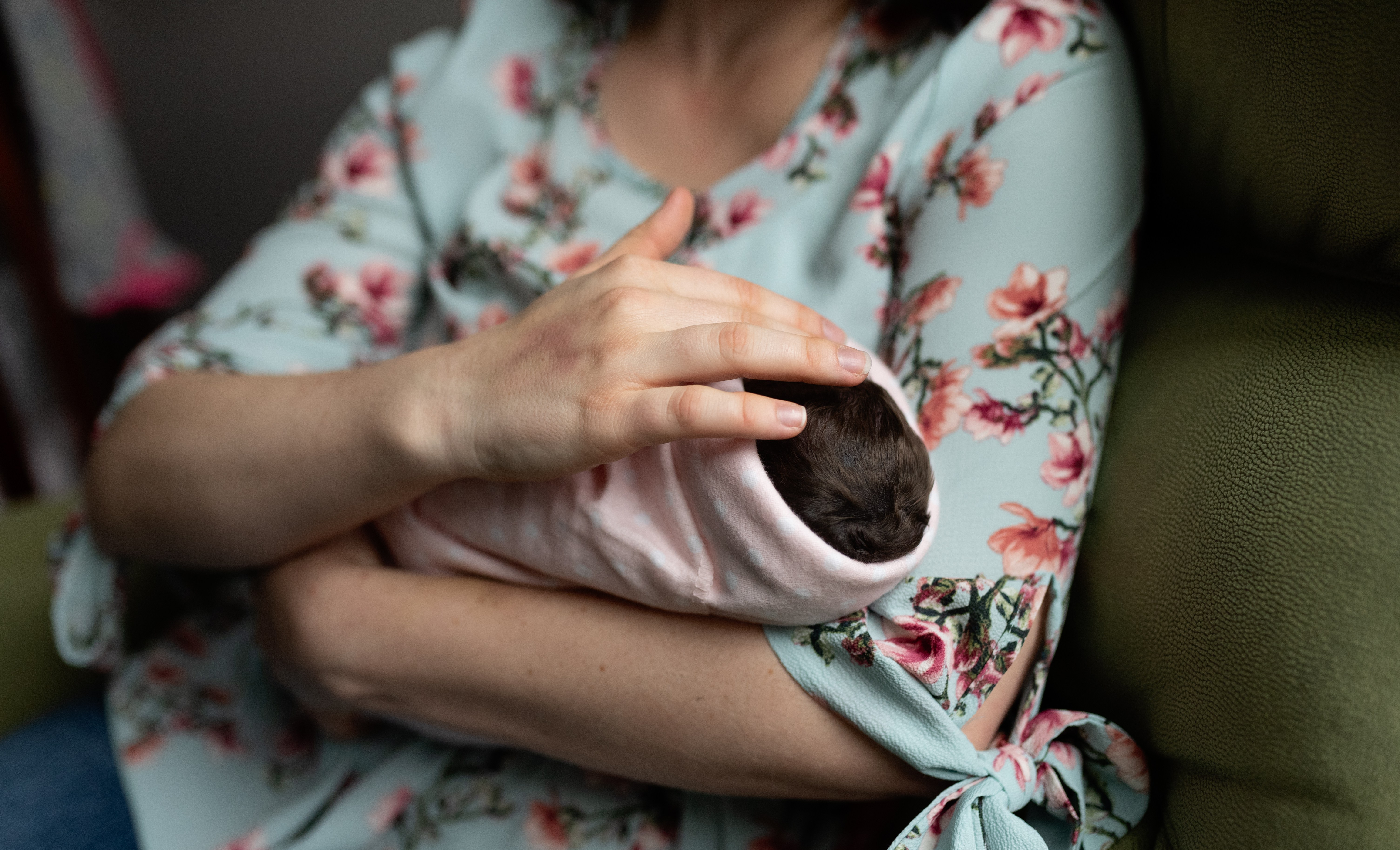 By Camille Hawkins, LCSW.
By Camille Hawkins, LCSW.
This post is dedicated to my infertility sisters: Brooke, Laura, Jill, Lindsey, Liz, Whitney, Melanie, Bethany, Justine, Andrea, Mindy, and so many more friends and clients who have battled the journey of infertility, a failed embryo transfer, and/or pregnancy loss.
Today is her due date.
This morning my daughter’s teacher asked me how I was doing. We lost our baby girl just nine weeks ago. “Doing alright,” I said. She thanked me for giving her a birth announcement/memorial card and talked about how beautiful our daughter was. She told me her own daughter miscarried on Christmas. She shared our card with her daughter and said they had a good cry together. Mine must be harder, she said, because I had an actual baby.
After my first IVF cycle in 2013, I saw my first ever positive pregnancy test. We had finally made it. We would be parents after enduring the treacherous swamp of infertility. We transferred two embryos. So, we wondered, would we be having one baby or two?
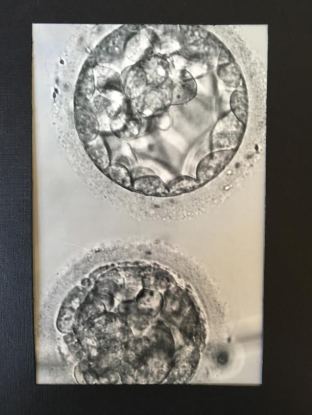
Even though my pregnancy hormone levels increased at the second blood draw, the day before Thanksgiving I began cramping and bleeding in a way that I knew the pregnancy was over. I was five weeks pregnant. The nurses assured me cramping was normal and early bleeding was common, so not to give up hope. I spent that Thanksgiving knowing my precious embryos, my babies, had attached to my womb, and then died inside of me. The next morning my third blood draw confirmed I was miscarrying.
We called my parents to tell them the news. They were surprised by the pregnancy because they didn’t know we had gone through with IVF, and devastated for us that we lost the pregnancy. Over the next few days my body expelled the embryos and all of the material that was growing inside my body to support them. I was shocked by the amount of tissue that passed at only five weeks along. I put my positive pregnancy tests, the pictures of my embryos, and a necklace I bought to memorialize my babies into a small box. And that was that.
We weren’t out of the closet about our infertility. And for sure we weren’t out of the closet about our pregnancy. The norm is to wait until the first trimester is over, at which point the rate of miscarriage decreases. Once you’ve made it to the “safe zone” you can announce to the world your baby will be joining your family. Announcing sooner would mean more couples have to back pedal because one in four pregnancies end in miscarriage before 20 weeks gestation. “Actually we’re not going to have a baby, we miscarried!” Those announcements aren’t typically associated with cute pictures of partners kissing behind an ultrasound photo. Those announcements aren’t typically associated with any pictures at all. What would you take a picture of?
At the time of our miscarriage, we were three years into our infertility journey. In 2010 we began with a year of tracking cycles, taking temperatures, and timed sex. If you’ve never done this before, just imagine. It’s pretty romantic. We moved on to exploratory surgery, three treatments of Intrauterine Insemination, and then moved to In Vitro Fertilization. If you’ve been through these treatments you know how involved each is. And you know how expensive they are too.
After our miscarriage I remember experiencing the darkest days of my life. That time is blurry for me, but I remember the deep feelings of grief and loss I felt inside. Two, independent, living things had died inside me. Each had unique DNA. I believe one was a boy and one was a girl, but I don’t really know. If you were to look at the chromosomes of the embryos, you could tell. They are XX or XY from the moment of conception when two cells combine to make one living thing.
I went to a support group for pregnancy and infant loss. The other women there had lost babies who had been born. “How far along were you?” they asked. I didn’t feel welcome. Most of them, still grieving the loss of their babies, were pregnant again. I didn’t fit. I couldn’t get pregnant again that easily. And only had a miscarriage. I didn’t lose an “actual” baby.
After six months we got up the courage to try again. We began filling ourselves with hope that this could work. We made it to pregnancy last time, so we could do it again! And our doctors would help us do a super-charged cycle to make sure we had absolutely everything in our favor. The result? All our embryos died in the lab. We didn’t have the opportunity to transfer them to my uterus because they were dead. We were defeated again. We had no pictures of our embryos and no positive pregnancy test to put in our memory box. And of course, no baby.
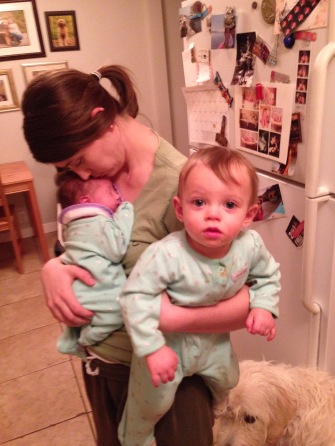
Without anymore hope on the treatment front, we moved to adoption and welcomed our two beautiful daughters, 10 months apart, into our home in 2015. Nothing was better than becoming a mom to a baby we could feed, rock, and change her diaper. Parenting was hard, but so beautiful and rewarding too.
Then almost four years later we had the shock of our lives. We were pregnant. No medical interventions. Just good old fashioned love-making at home. Fearful of pregnancy loss, we moved forward cautiously-optimistic. At each week, and each milestone, we felt relieved. We had made it to 20 weeks and our daughter’s anatomy scan was perfect. We made it to 24 weeks, the age of viability. We were safe, I thought. We were so excited to be welcoming another little girl into our family! We decorated the nursery, got all the girl clothes back from my sister, took a Hypnobabies birthing class, and awaited her arrival.
Then one day, at 31 weeks gestation, I couldn’t feel our baby move as much as usual. I listened to her heartbeat on our home doppler which sounded good, then left for the hospital to get checked, just in case. When we arrived at Labor and Delivery 15 minutes later, we learned our daughter had died. How could this have happened?
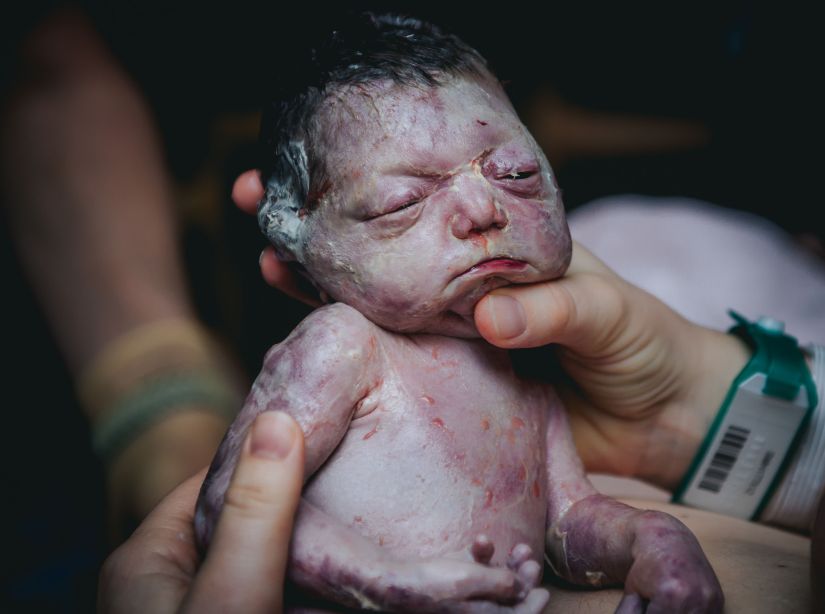
The next few days and weeks were a lot of things. Thoughts, experiences, and feelings that I won’t go into much detail here–I’ll need a whole book for that. But I had a 36 hour labor and gave birth to our perfect little girl, Everly Camille Hawkins, on Thanksgiving morning 2018. Exactly five years from when we miscarried our first pregnancy. We spent three days and two nights with our daughter in the hospital, drove with her from the hospital to the funeral home, took her home one afternoon to make memories in her nursery, dressed her for her cremation, went with her to the crematory, put her casket in the oven and pressed the button to start the cremation process. We now have her ashes in her nursery along with her hand molds, blankets she was wrapped in, a lock of her hair, clothes she wore, and framed pictures of her ultrasounds. It’s a sanctuary where I can feel her sweet spirit.
I know we should never compare. But of course I unconsciously do it. We all do. We do it consciously too. I experienced a pregnancy loss at 5 weeks and one at 31 weeks. I had experienced a miscarriage of embryos and the stillbirth of a baby. Although I don’t think it’s a good idea for anyone to compare losses between people and say which was “harder,” I couldn’t help but examine a few differences in my own pregnancy loss experiences. Here are three stark differences that have affected my grief journey with our daughter Everly so far:
Evidence: I had the physical evidence that my baby died. I could see the evidence, and others could see it. I had eight months of pregnancy pictures, I had ultrasound photos and videos, I had a lock of her hair, my maternity clothes, and more. She was real. I saw her beautiful curly hair with my own eyes. She was here, and now she is gone. Many believe this evidence of death must make it harder than a miscarriage where a baby was never felt, a pregnant belly never seen. Maybe.
Support: I had the support of my community. Because my world knew I was pregnant and in my third trimester, and I was willing to share our experience, our community knew our baby died. Everyone jumped to help us. Everyone’s hearts were broken. Everyone saw the pictures of our beautiful baby and many tears were shed by our community. My community provided meals, childcare, and house cleaning. All were so needed and forever appreciated. But I didn’t have this in my miscarriage or any of my failed cycles. No one else knew. And if they did, the level of support would likely be in relation to the amount of grief and loss our community associates with a miscarriage. This is just how it is.
Mourning: I had opportunities to mourn. Grief consists of the feelings and experiences we go through as a result of a loss whereas mourning is what we do to work through that grief. I held my daughter on my chest after I gave birth to her. I dressed her, changed her diaper, took pictures of her, sang to her, rocked her. We had a memorial service for her. And we have her ashes we can hold next to our hearts. We had very little from our miscarriage to help us mourn.
I’m not saying that one of my losses was harder than the other. But I am saying there was a much clearer path to mourning my loss after my stillbirth. During my miscarriage, I was in utter darkness. Completely alone. Invisible. No direction. No support. No validation. A broken heart with no physical evidence to help my soul understand, and no physical evidence for others to see as well. It was nobody’s fault I was in this situation with very little support. Most people didn’t know. I didn’t tell them.
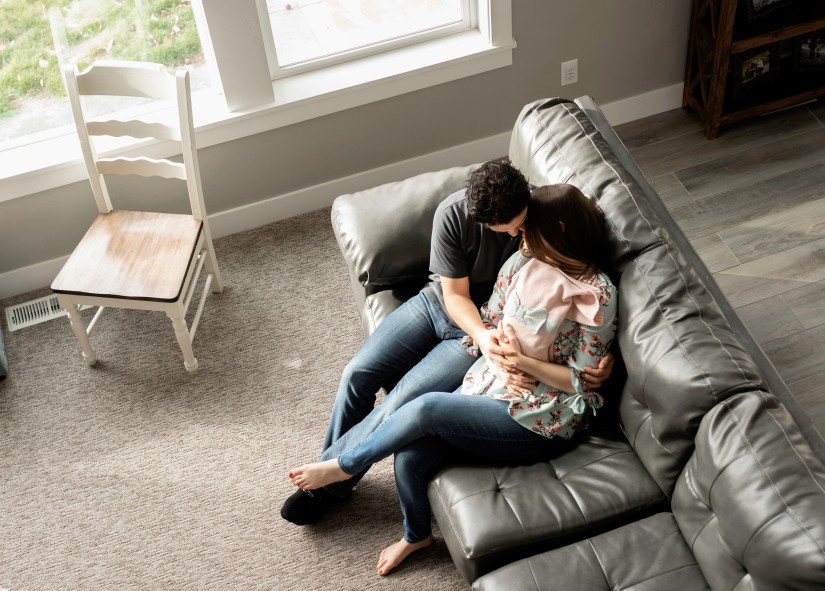
Your brain knows the difference between a miscarriage, a stillbirth, and a failed embryo transfer, but your heart never will. You lost a baby. You lost a dream. You lost an opportunity. A separate, living being died inside you where it was supposed to grow and flourish. Each person’s experience of grief and loss is going to be personal. Each experience of mourning will be unique. Yet there will likely be similar themes. Do what you can to honor your loss and honor the loss of others. Even if you never saw the baby with your eyes.
Jan 2022 Update: As I reflect back on my journey over the last three years of grieving and morning our daughter Everly, it definitely has been quite a journey, just as my experience with my miscarriage was. I birthed a healthy baby boy in April 2021 conceived via egg donation and my pregnancy was very challenging emotionally due to the trauma I had experienced in the loss of my daughter. I was able to build a strong support team to assist me through the pregnancy. I am still on my lifelong journey of grief and loss of my daughter Everly as well as my embryos, but feel I have benefited immensely from the grief and trauma work I have done personally which has allowed me to live and love again.

Thank you so much for having the strength to tell your story. I now have two grown sons and a 22-month-old granddaughter, but I still remember the silent grief and darkness of the two miscarriages I suffered over 20 years ago. You expressed it so eloquently; I’ve always felt guilty at claiming the two miscarriages as “real” losses, compared with the heartbreak of a still-birth. Time heals, but we never forget. May your daughter’s memory be for a blessing.
LikeLike
Thank you for sharing your sweet comment. It’s easy to downplay our own grief by saying it’s not as bad as someone else’s because of x,y,z. I think it’s a coping mechanism as our brain tries to deal with the pain by discounting it and trying to convince ourselves we don’t need to feel so horrible. But our heart knows and feels regardless of what our brain believes.
LikeLiked by 1 person
Thank you for sharing. Quite a poignant read. I was never able to conceive, and the grief of this is also real. I equate it to the death of someone you loved unconditionally for your whole life, but who never existed at all. ❤ I have had the benefit of support from friends and family, who folded me in and never made me feel "wrong" for my feelings.
LikeLike
Thank you Kam. Grief of infertility or childlessness is very real. And it’s one of the most difficult types of grief to face, in my opinion, because it’s invisible. For women who ovulate, the egg they release was alive, then dies inside them. Explaining this to women sometimes helps them have something visual to realize their loss is very real.
LikeLike
Thank you for saying the reality of the issue. You feel as though you are a vessel of death after something like this happens. It’s the worst feeling in the world.
LikeLike
Yes Elizabeth, exactly!
LikeLike
I appreciate the thoughts you shared very much. I’m blessed to have six children who share our life and I’ve lost three babies before they were born. The first loss was my fourth pregnancy, eleven years ago, at eleven weeks along. I since had three more children. Then a wonderful surprise pregnancy last year ended in the devastating stillbirth of our daughter at 29 weeks along. We had the blessing of finding ourselves expecting again about three months later, but that pregnancy ended in miscarriage of another sweet girl at 15 weeks. Each of these losses were excruciating and the experience of them distinct from one another. The physical differences are what stands out most, because the emotional differences are more difficult to quantify. And they weave together – the physical and emotional. The awareness that my womb was a tomb three times is hard. I’m grateful for the time we had with our daughter who was stillborn – while she was still alive and growing within me, and after she was born and we had two days with her physical remains, learning how to mother her in death and share her with her siblings. Not having the opportunity for that time with my recent baby is sad. I don’t know if it makes it harder or not. It’s all just hard. Losing a child is the worst. As bad as it gets. The sadness of another loss just seems to join it there in the depths of the worst.
LikeLike
Erin, thank you for sharing your heartbreaking story.
LikeLike
This is beautiful. I have suffered losses as well. Thank you for sharing your bravery, honesty and courage. These sentences are perfect. “Your brain knows the difference between a miscarriage, a stillbirth, and a failed embryo transfer, but your heart never will. You lost a baby. You lost a dream. You lost an opportunity”. Thank you for finding the words to express how so many of us feel. Sending love, Kathryn
LikeLike
Thank you for your kind words Kathryn.
LikeLike
You echoed all of my thoughts on this. While i have never suffered infant loss or a still birth i have endured 2 miscarriages after years of infertility and theres no proof of those babies other than my own pain and a few old positive pregnancy tests. Each year sees me thinking about how old they would be what they would be like. I beleive mine were girls i have 2 healthy boys who i love and cherish but i cant help but wonder if those first 2 were the girls i beleived i would always have. Both losses are hard but with miscarriage you are alone.
LikeLike
Thanks Shannon for sharing your story of infertility and miscarriage.
LikeLike
Shannon, thanks for your comment. The loneliness makes infertility and miscarriage unbearable.
LikeLike
Thank you for your story. I, too, am a bereaved mother but my daughters lived into childhood and early womanhood before the devastating disease, Cystic Fibrosis, took them. One at 12 years old, the other at 22. I will never forget being told by a clergy woman that the loss of a parish to an ordained person (she had been fired from the church where she was pastor) was worse than a mother losing her child! And so I wrote in my book, A Mosaic Heart: Reshaping the Shards of a Shattered Life, published in 2012, that grief should NEVER be compared. The loss of any precious being that has inhabited our wombs for any length of time is just a hairsbreadth from being absolutely unbearable. And yet we survive.
LikeLike
May I correct my website? Sorry, tears running down my cheeks.
LikeLike
Camille- Thank you for sharing your light during what I know are dark early days. Everly is beautiful and I’m
glad you can feel her spirit in your home and heart. Thinking of you with love.
-Danielle (the New Yorker from ASRM who is among your biggest fans)
LikeLike
Thanks Danielle, it’s great to hear from you!
LikeLike
I think the hardest part of early miscarriage is the uncertainty and especially the loneliness. I appreciate so much how you explained that challenge. I have had three 1st trimester miscarriages. My last was 13 weeks and I never heard a heartbeat. My sister told me not having a heartbeat should make it easier to get over because it was never really alive. I lost a good friend of mine in that same year and my body ached with the same kind of grief. Having support helps so much. Thank you for your well written article.
LikeLike
Ashley, I’m sorry for your losses. Thank you fir sharing. It’s important to let each person feel each loss however it feels to them.
LikeLike
Your blog is amazing! I came from your post about infertility in the Church and very much needed to read that. Sometimes it is nice to be reminded that we’re not alone. Thank you for sharing! I am so sorry for your losses. My latest miscarriage started the same day our sweet little niece passed away from SIDS. I learned a lot about comparing losses during that time. We were the closest family geographically, so naturally, we felt the need to be present, help where we could, and host those who traveled from out of town. Being strong for our extended family and grieving along with them while my husband and I silently dealt with our own personal loss was so hard. Losing myself in service helped for the time being, but ultimately, when things settled down those feeling were all still there waiting to be processed. That short pregnancy was years in the making/hoping/praying and came at a point where we were starting to talk about when to walk away from the “trying” stage and move forward with life and our family as it is. I learned that it is okay and necessary to let yourself grieve and that someone else’s grief/loss, no matter how unimaginable, can’t make your own hurt any less.
LikeLike
Michelle, thank you for your beautiful insight.
LikeLike